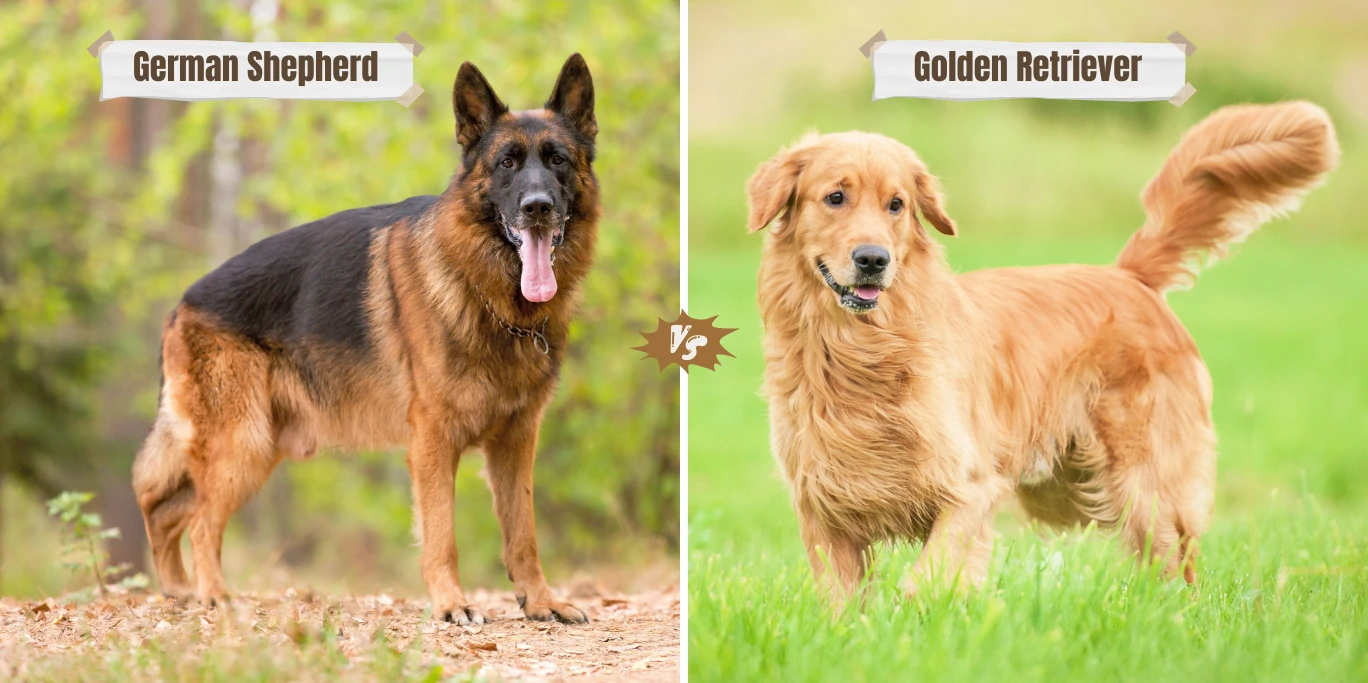
Choosing between a German Shepherd and a Golden Retriever is like picking between two blockbuster movies; both have their loyal fanbase, captivating traits, and a legacy of loyalty and love.
But what makes these breeds so different, and more importantly, which one will slide seamlessly into your lifestyle? If you’re teetering on the edge of this decision, you’ve come to the right place.
In this comprehensive guide, we will pull back the curtain on these two of the most popular dog breeds, diving deep into their origins, physical attributes, temperaments, and much more.
By the time you reach the end, you’ll have a well-rounded view of what each breed brings to the table, making your choice not just easier but tailored to your specific needs and expectations.
Whether you’re looking for a family companion, an exercise buddy, or even a specialized service animal, understanding the differences between a German Shepherd and a Golden Retriever can be the key to a harmonious relationship with your future furry friend.
So, let’s embark on this exciting journey and unveil the intricacies that set these breeds apart.
| Breed Comparison | German Shepherd | Golden Retriever |
|---|---|---|
| Weight | 50 - 90 pounds | 55 - 75 pounds |
| Height | 22 - 26 inches | 21.5 - 24 inches |
| Size | Medium to large | Medium |
| Temperament | Intelligent, loyal, courageous | Intelligent, loyal, friendly |
| Trainability | 5.0 out of 5.0 stars5.0 | 5.0 out of 5.0 stars5.0 |
| Energy Level | 5.0 out of 5.0 stars5.0 | 4.0 out of 5.0 stars4.0 |
| Life Expectancy | 7 - 10 years | 10 - 12 years |
| Shedding | 5.0 out of 5.0 stars5.0 | 5.0 out of 5.0 stars5.0 |
| Hypoallergenic | No | No |
| Puppy Costs | $800 - $10,000 | $1,000 - $9,000 |
Origins and History: German Shepherd vs. Golden Retriever
German Shepherd
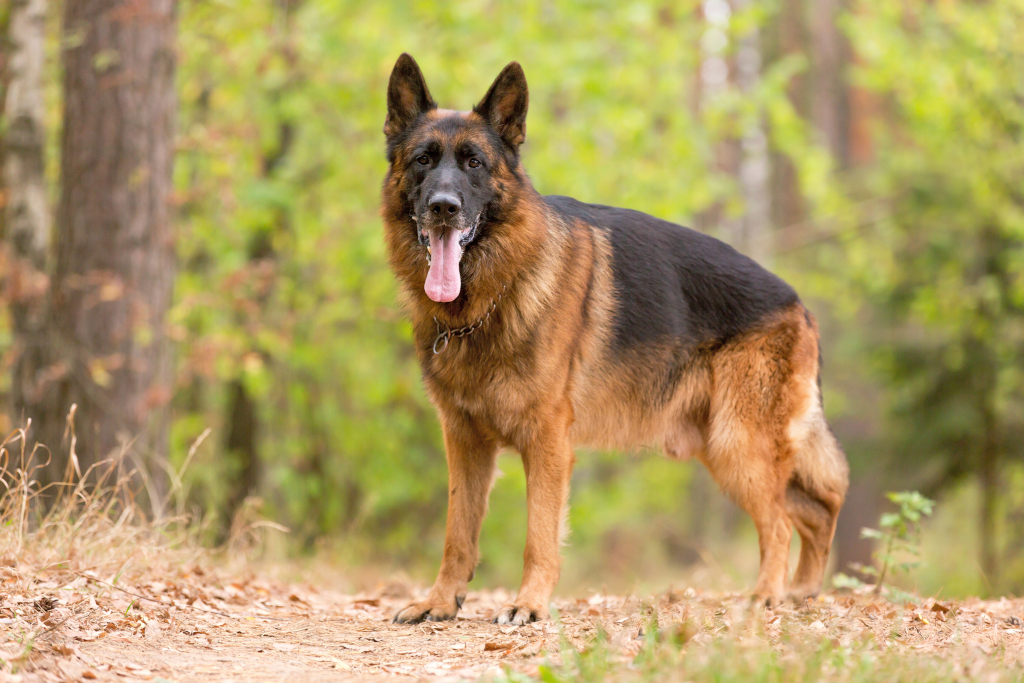
The German Shepherd’s roots can be traced back to Germany, where they were initially bred to serve as herding dogs for flocks of sheep.
Captain Max von Stephanitz, who is credited with developing the breed, sought to create the ultimate working dog—one that was intelligent, versatile, and incredibly trainable.
The German Shepherd’s role has expanded considerably over the years; you’ll find them engaged in everything from police work and military service to search and rescue operations.
Their innate intelligence and exceptional senses make them unparalleled in roles that require focus, obedience, and quick decision-making.
Golden Retriever
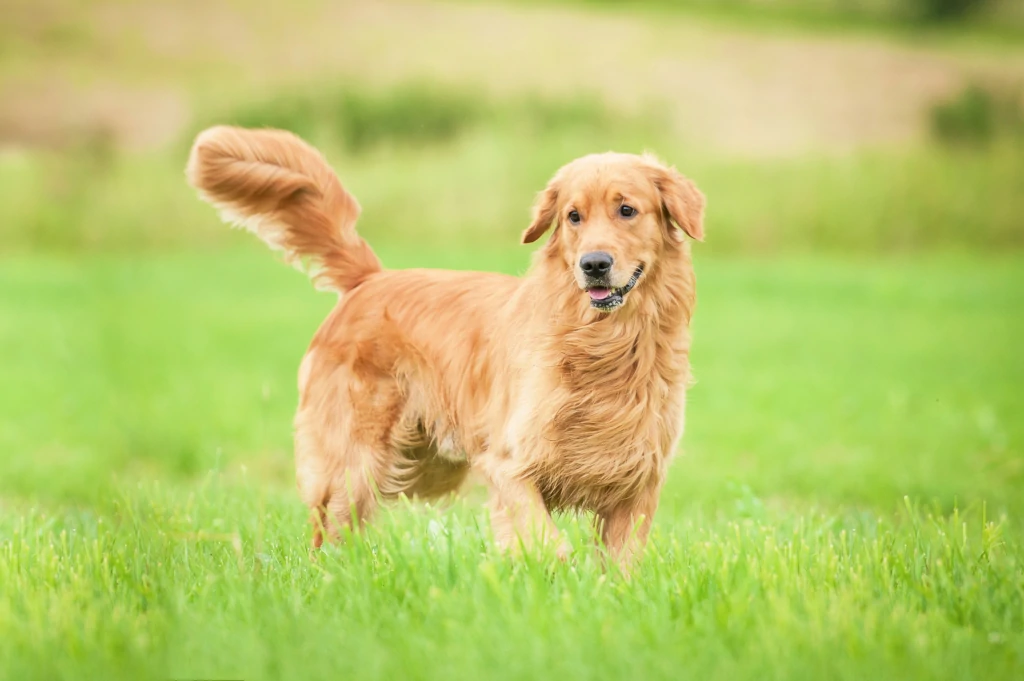
Hailing from the Scottish Highlands, the Golden Retriever was meticulously developed by Lord Tweedmouth in the mid to late 19th century for a specialized purpose: to be a perfect gundog.
Initially bred to function in the Scottish landscape, the Golden Retriever was created to handle the varied terrain—ranging from marshlands to forests—making them perfect for retrieving downed game from both water and land.
Lord Tweedmouth aimed to create a dog that was not only reliable but also highly skilled in the art of retrieval during hunting outings. The breed was specifically fine-tuned to find and bring back waterfowl like ducks and game birds like pheasants.
With their soft mouths, they could grip and carry the game without damaging it, a quality highly prized by hunters. Their waterproof coat allowed them to swim efficiently, making them ideal for retrieving waterfowl from lakes and rivers.
In modern times, they have also earned themselves roles as therapy and assistance dogs, further solidifying their status as a versatile and beloved breed. Also, their easy-going nature, trainability, and desire to please quickly made them a popular choice for families.
You May Also Like: 11 Best Hunting Dog Breeds
| Aspect | German Shepherd | Golden Retriever |
|---|---|---|
| Country of Origin | Germany | Scotland |
| Initial Purpose | Herding sheep | Retrieving waterfowl and upland game birds |
| Developed By | Captain Max von Stephanitz | Lord Tweedmouth |
| Year of Origin | Late 19th century | Mid to late 19th century |
| Modern Roles | Family pets, police dogs, military dogs, search and rescue dogs, service dogs | Family pets, therapy dogs, fieldwork, service animals |
| Key Traits | Intelligence, versatility, trainability | Amiability, eagerness to please, intelligence |
| Year Recognized by the American Kennel Club | 1908 | 1925 |
** Comparison Table: Key Differences in Origins and Roles
Author Note: Diving into the origin stories of the German Shepherd and the Golden Retriever provides a glimpse into the characteristics carefully cultivated over generations. Their histories are vastly different, each originating from distinct needs and societal roles. These foundations have shaped them into the breeds we know and adore today.
Comparing Physical Appearance and Characteristics
When it comes to physical attributes, both the German Shepherd and the Golden Retriever have standout features that not only contribute to their good looks but also define their capabilities and suitability for various roles.
German Shepherd
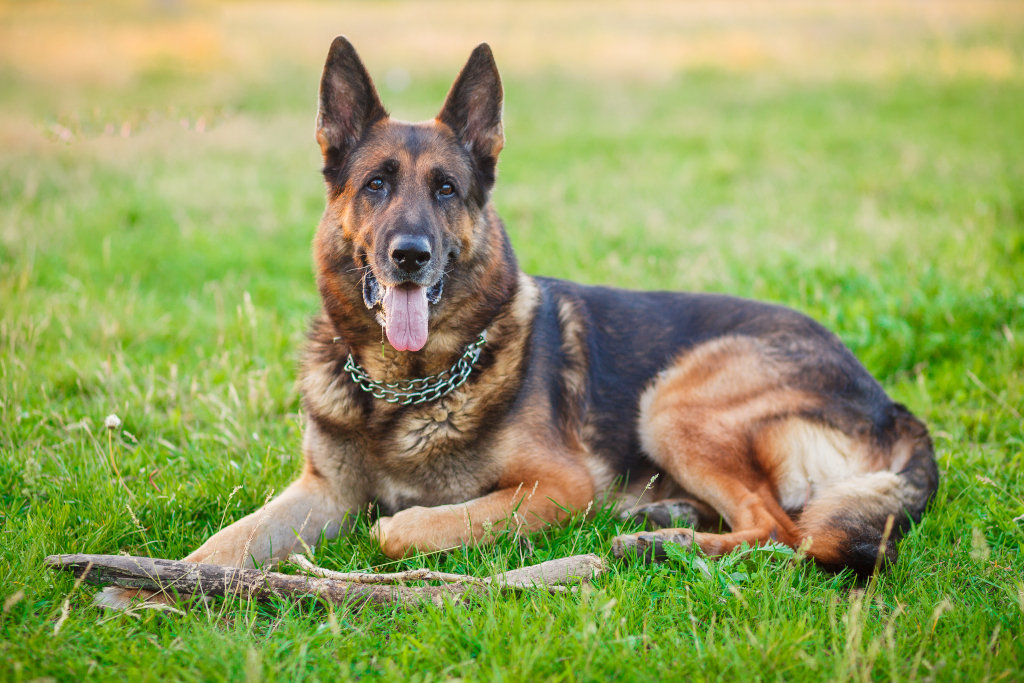
A German Shepherd is a medium to large, robust, and agile dog, usually standing between 22 and 26 inches at the shoulder and weighing 50 to 90 pounds.
They possess a strong, muscular build that allows for agility, speed, and endurance. The breed features a double coat that can be short or medium length and comes in various colors, including black and tan, sable, and even solid white or black.
You may also come across German Shepherds with long hair. However, this is considered a fault in the AKC breed standard. So, if you’re looking for a show dog, you’ll want to choose one with the standard coat.
German Shepherds have a distinct face with a strong jaw, keen eyes, and pointed ears, which give them a vigilant and intelligent expression.
You May Also Like: 5 Popular Types Of German Shepherds (With Pictures)
Golden Retriever
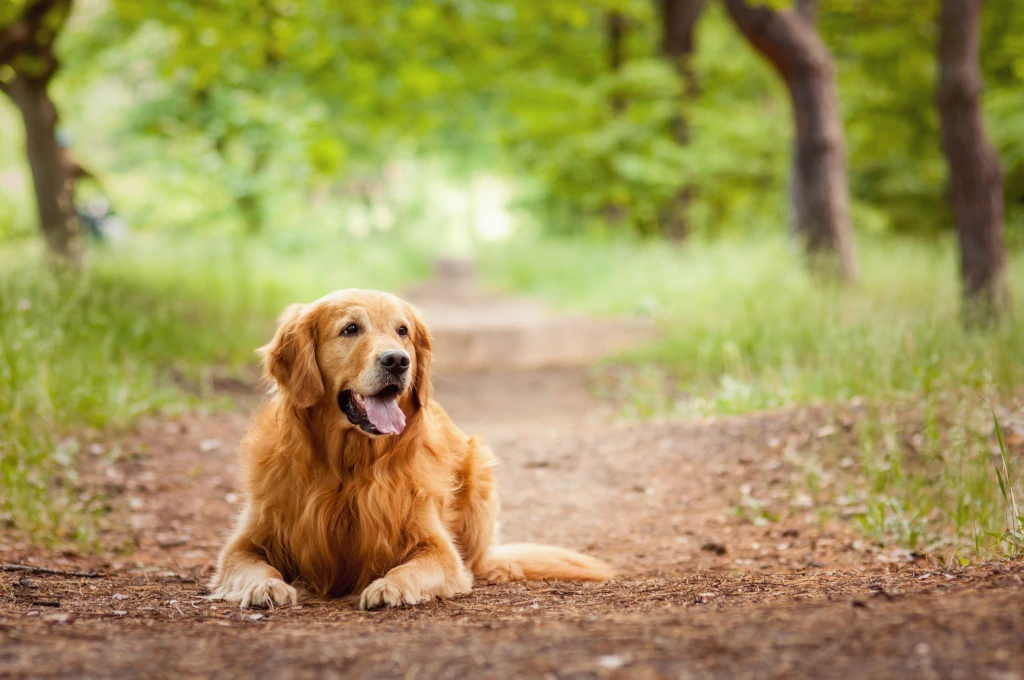
Golden Retrievers are medium-sized dogs, typically standing 21.5 to 24 inches at the shoulder and weighing between 55 and 75 pounds.
They have a well-balanced, sturdy build, a “soft, kind” expression characterized by friendly and intelligent eyes, and relatively short ears that sit just above the eye, hanging close to the cheeks. Their body is robust, featuring a deep chest that lends itself to their energetic nature.
Their coat is one of their most distinguishing features. It’s dense and water-repellent, providing excellent protection against harsh weather conditions.
The color can range from light to deeper golden, but there’s also a beautiful red variety, though, like long-haired German Shepherds, you won’t be able to show them in AKC conformation shows.
You May Also Like: Red Golden Retrievers (With Pictures)
| Aspect | German Shepherd | Golden Retriever |
|---|---|---|
| Build | Strong, muscular, agile | Well-balanced, sturdy |
| Male Weight | 65-90 pounds | 65 - 75 pounds |
| Male Height | 24 - 26 inches | 23 - 24 inches |
| Female Weight | 50-70 pounds | 55 - 65 pounds |
| Female Height | 22 - 24 inches | 21.5 - 22.5 inches |
| Coat Type | Double coat, short- or medium-length | Double coat, medium or long, water-repellent |
| Coat Colors | Black & cream, black & red, black & silver, black & tan, black, gray, sable, white, liver, blue, bi-color | Various shades of gold |
** Comparison Table: Key Differences in Physical Characteristics
Temperament and Personality: German Shepherd vs. Golden Retriever
German Shepherd
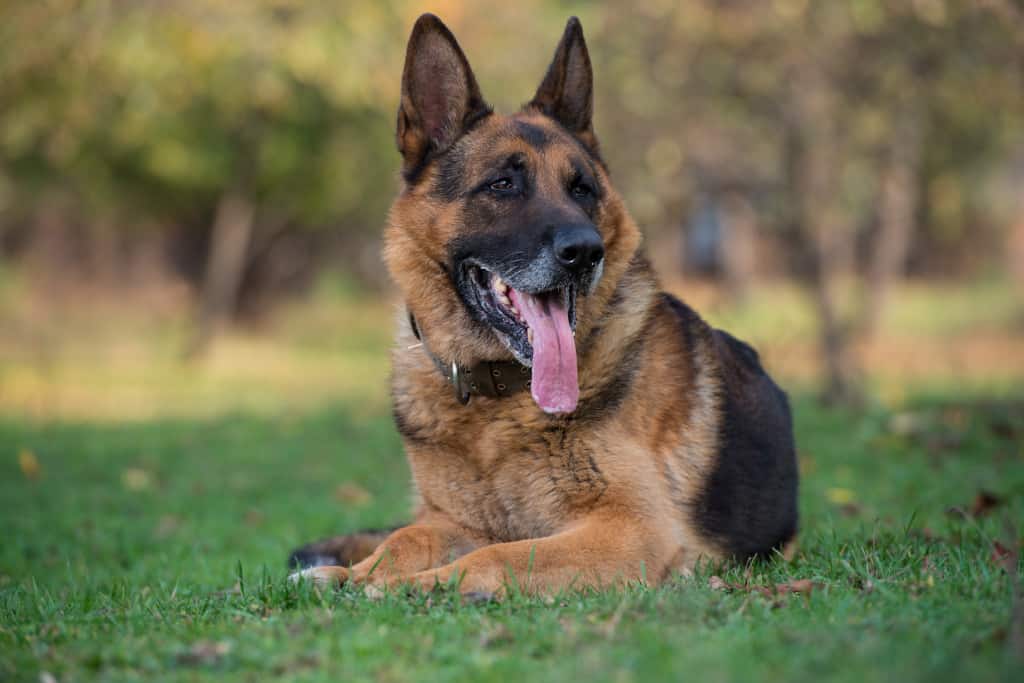
German Shepherds are revered for their intelligence, loyalty, and protective nature.
Known for their ability to pick up new commands and tasks quickly, they are highly trainable and often excel in obedience trials. Their protective instincts make them excellent guard dogs who are ever-vigilant and alert to potential threats.
This breed is also known for forming strong bonds with their families and can be reserved or aloof with strangers until they’ve assessed that there’s no danger.
You May Also Like: 10 Top Guard Dog Breeds for Your Home
Golden Retriever
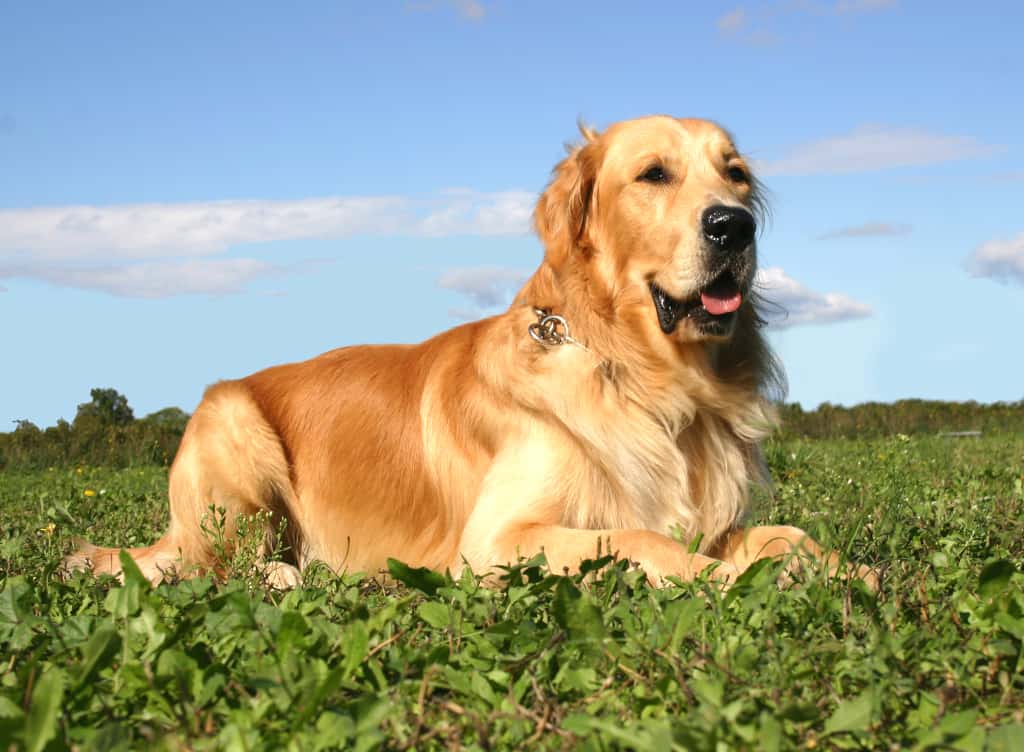
Golden Retrievers, on the other hand, are often the epitome of friendliness and sociability.
They’re quick to greet strangers with a wagging tail and are generally non-aggressive. In fact, you’ll often hear Golden Retriever owners comment on how their dogs welcome anyone with open paws.
Their intelligence is coupled with an eagerness to please, making them quick learners who are highly trainable in obedience and trick commands.
While Golden Retrievers may not be the best guard dogs due to their friendly nature, they excel in roles requiring empathy and human interaction, such as therapy and assistance work.
You May Also Like: 10 Top Dog Breeds Perfect for Kids and Families
| Aspect | German Shepherd | Golden Retriever |
|---|---|---|
| Temperament | Loyal, protective, courageous | Friendly, sociable, eager to please |
| Guarding Instinct | Strong | Weak |
| Affinity for Families | Forms strong bonds with families | Forms strong bonds with families |
| Adaptability to Strangers | Reserved until assessed | Quick to greet and socialize |
| Vocalization | Barks to alert and guard; more reserved | Barks to gain attention; sociable and expressive |
** Comparison Table: Key Differences in Personality Traits
Author Note: Understanding these unique personality traits will help you identify which dog breed aligns more closely with your lifestyle and needs. Whether you seek the loyal guardianship of a German Shepherd or the friendly companionship of a Golden Retriever, being aware of these differences can guide you toward a more fulfilling relationship with your future furry friend.
Energy Level and Exercise Needs: Golden Retriever vs. German Shepherd
The level of activity a dog requires can significantly impact your lifestyle and daily routine. Both German Shepherds and Golden Retrievers are active breeds, but the amount of exercise they need can differ.
German Shepherd
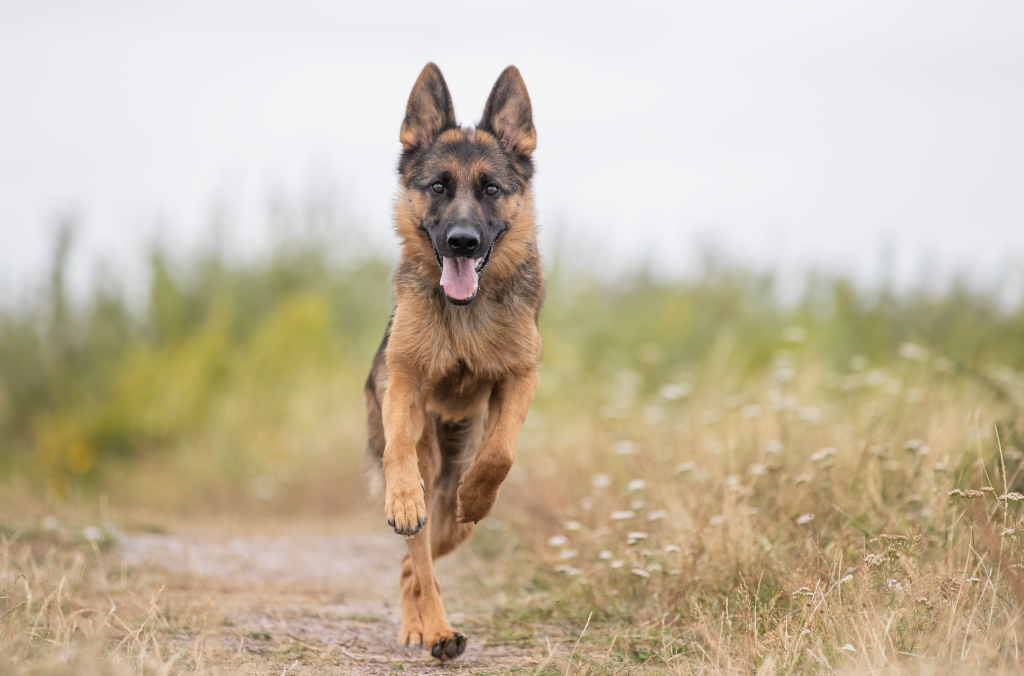
German Shepherds are high-energy dogs that require a good deal of physical and mental stimulation to keep them happy and healthy.
A minimum of two hours of exercise is recommended daily. This can include activities like jogging, hiking, and agility training, as well as mental challenges like puzzle toys or obedience drills.
Without adequate exercise, GSDs can become restless and may engage in unwanted behaviors like excessive barking or chewing.
You May Also Like: Cross-Country Running With Dogs Training Plan
Golden Retrievers
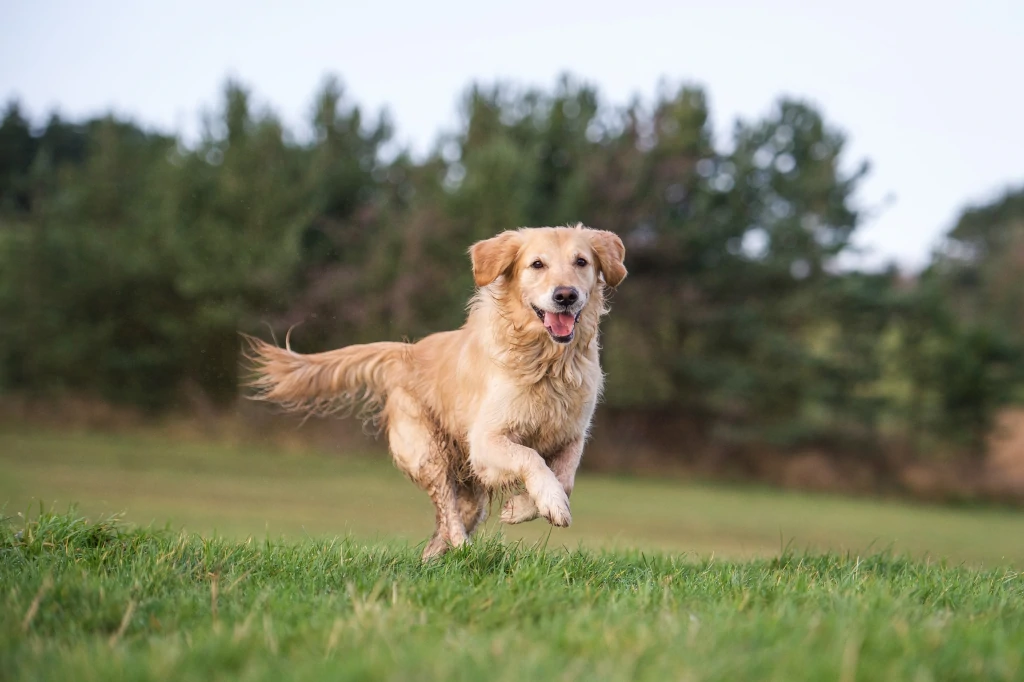
Golden Retrievers are also active and energetic, but their exercise needs are often less intense compared to German Shepherds. Around 60 to 90 minutes of exercise per day is generally sufficient.
Activities like fetching, swimming, biking, and leisurely walks can keep a Golden Retriever happy. They also enjoy playtime and are generally more laid-back than German Shepherds, making them easier to manage in smaller living spaces.
You May Also Like: Is Letting Your Dog Run Alongside Your Bike Cruel?
| Aspect | German Shepherd | Golden Retriever |
|---|---|---|
| Energy Level | High | High |
| Daily Exercise Needed | 2 hours | 60 to 90 minutes |
** Comparison Table: Key Differences in Exercise and Energy Levels
Author Note: Considering each breed's exercise and energy levels will help you make a more informed decision about which dog will fit seamlessly into your lifestyle. Whether you prefer the high-intensity demands of a German Shepherd or the more moderate activity needs of a Golden Retriever, understanding these aspects is essential for a happy, well-adjusted dog and owner.
Training and Intelligence: Who's the Quick Learner?
When it comes to intelligence and trainability, both German Shepherds and Golden Retrievers are often at the top of the list. However, how they learn and how easily they can be trained vary.
German Shepherd
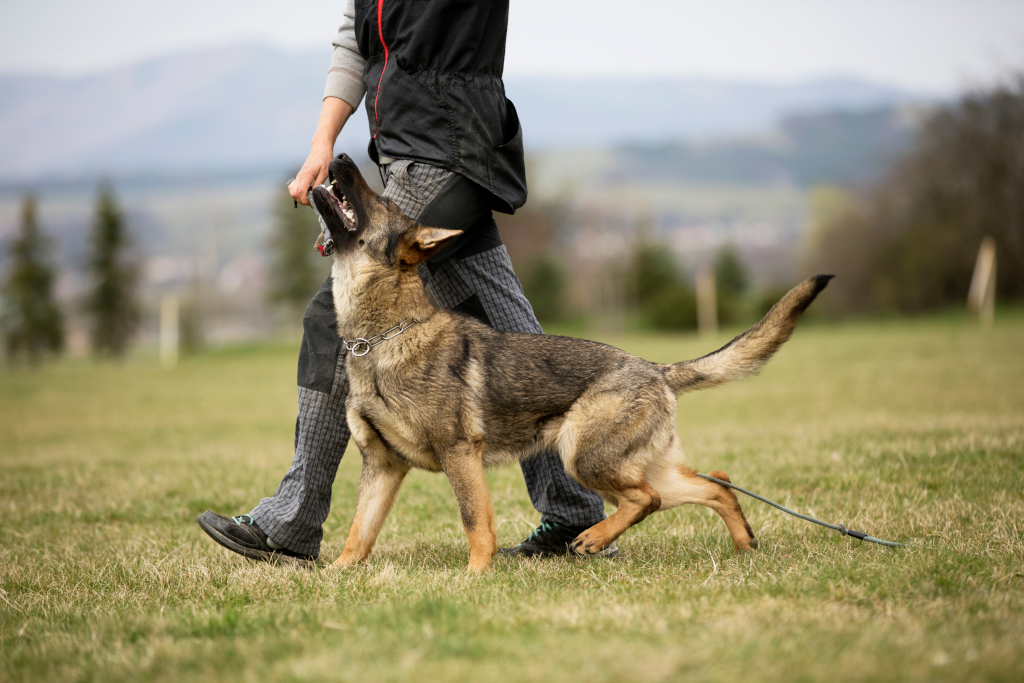
German Shepherds are frequently lauded for their intelligence, often ranking higher than Golden Retrievers in intelligence tests.
Their intelligence goes hand in hand with a desire to work and to please their human handlers. These traits make them quick learners who are relatively easy to train.
In fact, their keen ability to understand and respond to commands makes them exceptional working dogs in fields that require quick thinking, such as police work, military service, and search and rescue.
Yet, their intelligence doesn’t mean they’re pushovers; they can be stubborn sometimes, meaning they do best with an experienced owner who can assert leadership and provide consistent, positive reinforcement-based training.
You May Also Like: Top 7 Dog Training Techniques: Mastering Manners
Golden Retrievers
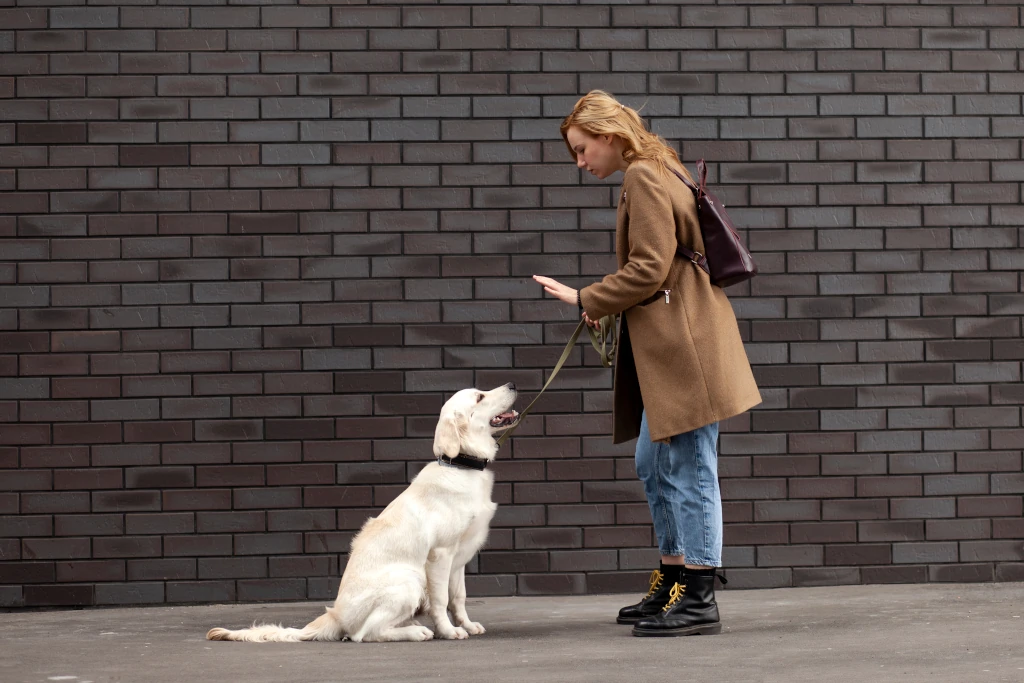
Golden Retrievers are also highly intelligent, but they bring an added level of eagerness to please their owners. This eagerness often translates into excellent trainability.
They excel in obedience training and can quickly grasp complex commands and tricks. Positive reinforcement techniques work extremely well with this breed.
Due to their friendly and sociable nature, they’re often easier to socialize compared to German Shepherds.
You May Also Like: Decoding Clicker Training: A Comprehensive Guide to Effectively Train Your Dog
| Aspect | German Shepherd | Golden Retriever |
|---|---|---|
| Intelligence | Extremely high | Very high |
| Trainability | High | High |
| Ease of Socialization | May require more effort due to natural guarding instincts | Easier due to natural sociability |
** Comparison Table: Key Differences in Training and Intelligence
Common Health Issues and Average Lifespan
Health considerations are a vital aspect of pet ownership that often gets overlooked amidst the excitement of bringing a new dog into your life.
Both German Shepherds and Golden Retrievers have specific health concerns that potential owners should be aware of. Knowing these can help you prepare for a long, healthy life with your furry companion.
German Shepherds
The average lifespan for a German Shepherd Dog ranges between 7 to 10 years.
They are generally healthy dogs, but like all breeds, they’re prone to certain genetic conditions. Among these are hip and elbow dysplasia, which can lead to arthritis over time. GSDs are also at risk for degenerative myelopathy, a severe spinal cord disease.
Golden Retrievers
Goldens typically live between 10 to 12 years. They also enjoy good health but can be prone to certain ailments.
Golden Retrievers are often susceptible to hip dysplasia, as well as various forms of cancer. Eye conditions like cataracts and heart issues like subaortic stenosis are also seen in this breed.
| Aspect | German Shepherd | Golden Retriever |
|---|---|---|
| Average Lifespan | 7 to 10 years | 10 to 12 years |
| Common Health Concerns | Hip and elbow dysplasia, degenerative myelopathy | Hip dysplasia, cancer, eye conditions |
** Comparison Table: Key Differences in Health and Lifespan
Author Note: Both breeds have their own sets of health challenges, but with proper care and regular veterinary visits, you can prepare for a rewarding and long-lasting relationship with your chosen companion.
Nutrition and Diet
Proper nutrition is non-negotiable when it comes to your dog’s health and longevity. While both the Golden Retriever and German Shepherd are large breeds with a fair amount of energy, their specific dietary needs can vary due to differences in activity levels, health risks, and whatnot.
German Shepherd
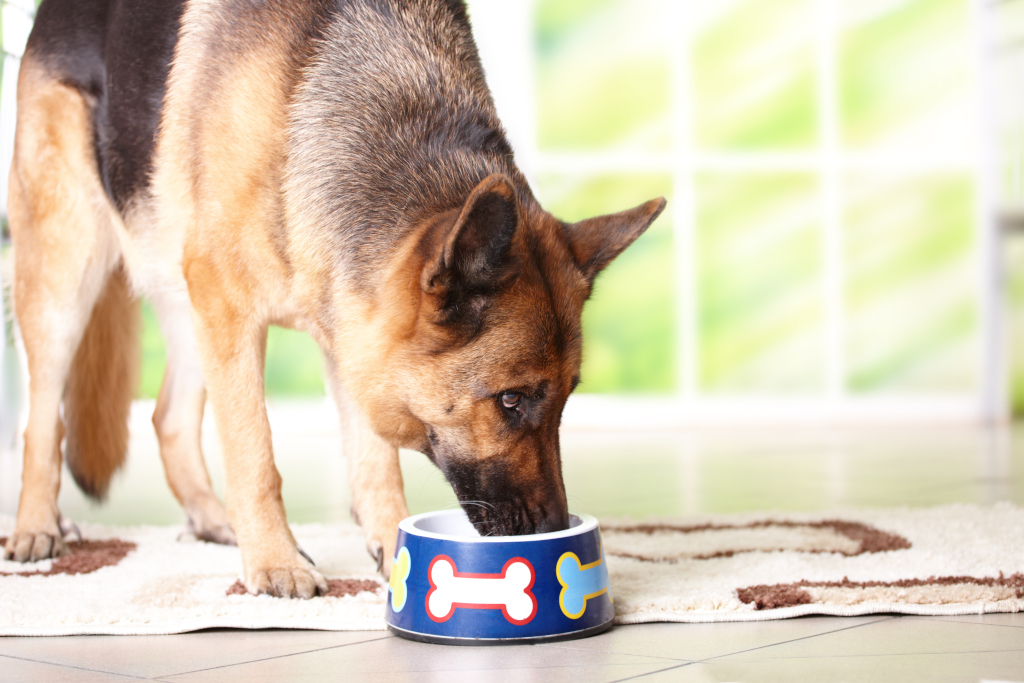
Given their high energy levels and active lifestyle, German Shepherds require a protein-rich diet to support muscle development and maintenance, and foods formulated for large breeds are often an excellent choice.
Generally, an adult German Shepherd may require between 3 to 4 cups of high-quality kibble daily, split into at least two meals to sustain their energy levels.
Additionally, because they are prone to joint issues like hip and elbow dysplasia, diets fortified with joint-supporting nutrients like glucosamine are beneficial.
Golden Retrievers

Golden Retrievers, though active, have a slightly lower energy profile compared to German Shepherd Dogs and can be prone to weight gain if not properly managed.
A balanced diet rich in protein, moderate in fats, and supplemented with fruits and vegetables for antioxidants is generally recommended. Given their higher risk for certain types of cancer, a diet rich in antioxidants could be a valuable addition.
Again, large-breed-specific foods can be a good option, and typically, an adult Golden Retriever may also need approximately 3 to 4 cups of high-quality kibble each day, divided into at least two meals.
| Aspect | German Shepherd | Golden Retriever |
|---|---|---|
| Daily Kibble Intake | 3 to 4 cups | 3 to 4 cups |
| Meal Frequency | Twice a day | Twice a day |
** Comparison Table: Key Differences in Nutrition and Diet
Grooming Needs: Golden Retriever vs. German Shepherd
German Shepherd
Grooming a German Shepherd requires attention and routine. These dogs have a double coat, meaning they can shed quite a bit, making regular brushing an essential part of their grooming routine.
To keep your German Shepherd’s coat looking shiny and healthy, you’ll want to brush them at least two to three times a week. This not only combats shedding but also helps to remove loose hair, dirt, and debris from their coat.
German Shepherds will “blow” their undercoat in the spring and fall, requiring more attention during those times.
Bathing for this breed is infrequent, often needed only every couple of months unless they get particularly dirty.
You May Also Like: Best Dry Dog Shampoos
Golden Retrievers
Golden Retrievers have a luscious double coat that, too, shed year-round and more intensely during the shedding seasons.
So you’ll also have to brush them two to three times a week and more often, ideally daily, during the shedding seasons to keep them looking and feeling their best.
Aside from brushing, bathing your Golden Retriever is also an important part of their grooming routine. However, you shouldn’t bathe your dog too frequently as it can strip its coat of natural oils, leading to dry and itchy skin. The frequency of baths will depend on your dog’s lifestyle and activities.
Moreover, their floppy ears can be prone to infections and should be checked and cleaned regularly.
You May Also Like: Best Dog Ear Cleaners
| Aspect | German Shepherd | Golden Retriever |
|---|---|---|
| Shedding | Year-round, peaks seasonally | Year-round, peaks seasonally, but typically shed more than GSDs |
| Brushing Frequency | Daily during shedding seasons, else 2-3 times a week | Daily during shedding seasons, else 2-3 times a week |
| Bathing Frequency | Every couple of months or as needed | Every couple of months or as needed |
** Comparison Table: Key Differences in Grooming Needs
Puppy Price: German Shepherd vs. Golden Retriever
German Shepherd
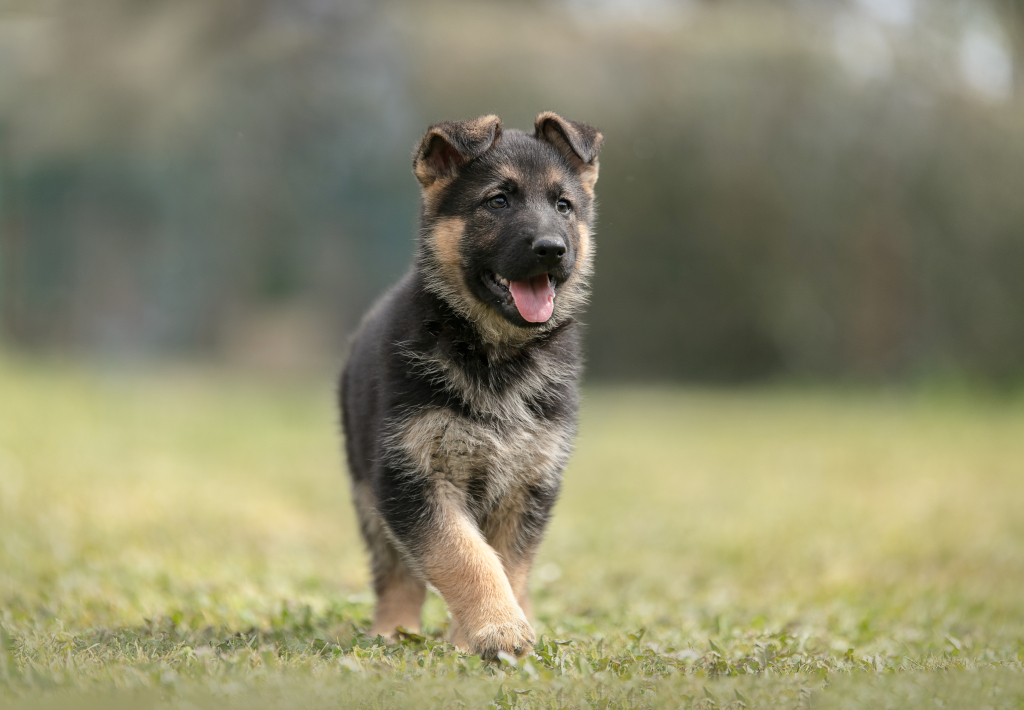
The initial purchase price for a German Shepherd puppy can vary widely depending on several factors, and pedigree is a huge price influencer. A pup from award-winning lines can cost upwards of $4,000.
Other factors like breeder reputation, location, and even coat color can affect the price. Always bear in mind that a lower price tag may be a red flag for unethical breeding practices or potential health issues.
You May Also Like: German Shepherd Price: The Full Cost of Owning a German Shepherd
Golden Retrievers
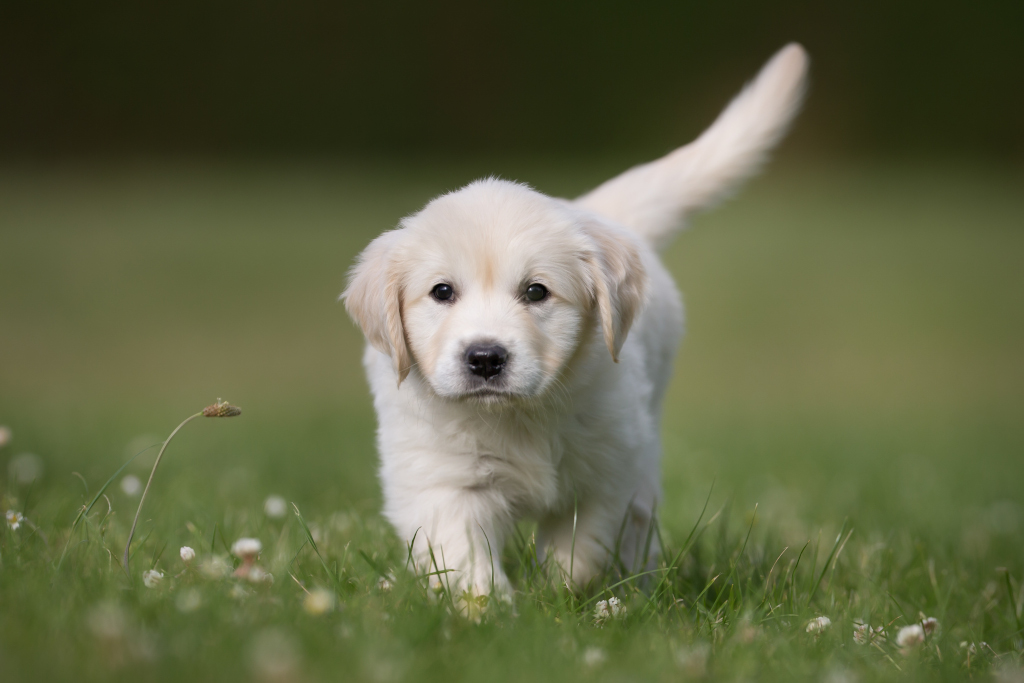
The price of Golden Retriever puppies can range from as low as $1,000 to as high as $5,000. The cost will significantly escalate if you seek a puppy from a line of champions.
Breeders also factor in costs like health screenings, early socialization, and initial veterinary care, all of which contribute to the overall price you’ll pay.
You May Also Like: Golden Retriever Price: The Full Cost of Owning a Golden Retriever
| Aspect | German Shepherd | Golden Retriever |
|---|---|---|
| Average Price Range | $800 to $4,000 | $1,000 to $5,000 |
| Average Elite Lineage Cost | $2,500 to $10,000 | $2,500 to $9,000 |
** Comparison Table: German Shepherd vs. Golden Retriever - Puppy Price
Author Note: Potential Golden Retriever and German Shepherd owners must also consider the ongoing costs of owning a dog. For instance, you should budget for food, toys, grooming supplies, and health care expenses. It's important to have a good understanding of these potential expenditures before getting either breed.
Which Breed is Better? German Shepherd or Golden Retriever?
When considering adding a dog to your family, understanding the social dynamics and family suitability of different breeds can greatly influence your choice.
German Shepherds and Golden Retrievers, while both excellent family pets, have distinct personalities and social needs, making them more or less suitable for various types of households.
German Shepherds: Guardians of the Home
German Shepherds are often considered among the best family watchdogs due to their strong protective instincts.
They are fiercely loyal and form deep bonds with their family members. This breed is excellent with children and tends to be cautious but respectful around strangers.
If you have a home with a yard and perhaps even older kids who can participate in dog training and exercise, a German Shepherd might be your ideal companion.
Golden Retrievers: The Social Butterfly
Golden Retrievers are renowned for their friendly disposition and are often considered the epitome of a family pet.
They are extremely social dogs, getting along well with children, adults, and other dogs. Their friendly demeanor makes them less suitable as watchdogs but excellent as companions.
They thrive in families that offer plenty of interaction and playtime. If your home is one that enjoys frequent guests and has an open space for your dog to run and play, a Golden Retriever would fit right in.
| Aspect | German Shepherd | Golden Retriever |
|---|---|---|
| Child-Friendliness | Excellent, protective | Exceptional, very friendly |
| Social Needs | Moderate, enjoys family time | High, loves social interactions |
| Watchdog Capabilities | Strong, alert | Limited, too friendly |
** Comparison Table: Family and Social Dynamics at a Glance
Key Takeaway: German Shepherds bring loyalty and a protective nature, making them excellent for families seeking a reliable guard dog for a bit more security. On the other hand, Golden Retrievers offer boundless love and social interaction, making them ideal for outgoing, active families.
Frequently Asked Questions About German Shepherd vs. Golden Retriever
Q1. Which breed is easier to train? German Shepherd or Golden Retriever?
A: German Shepherds often rank higher in terms of intelligence and focus, making them easier to train for various tasks. Golden Retrievers are intelligent but can be easily distracted.
Q2. Which breed is more social? German Shepherd or Golden Retriever?
A: Golden Retrievers are generally more social and friendly, loving nothing more than to be the center of attention. German Shepherd Dogs are loyal and loving with their families but can be reserved around strangers.
Q3. Is the German Shepherd or Golden Retriever more likely to get along well with other pets?
A: Both breeds can get along well with other pets, especially when socialized early. However, German Shepherds might be more selective in choosing their animal friends.
Q4: How much exercise do German Shepherds and Golden Retrievers need?
A: Both breeds have high exercise needs, but German Shepherds usually require more intense physical and mental stimulation. Golden Retrievers also enjoy outdoor activities and need regular exercise, but they are generally less demanding.

